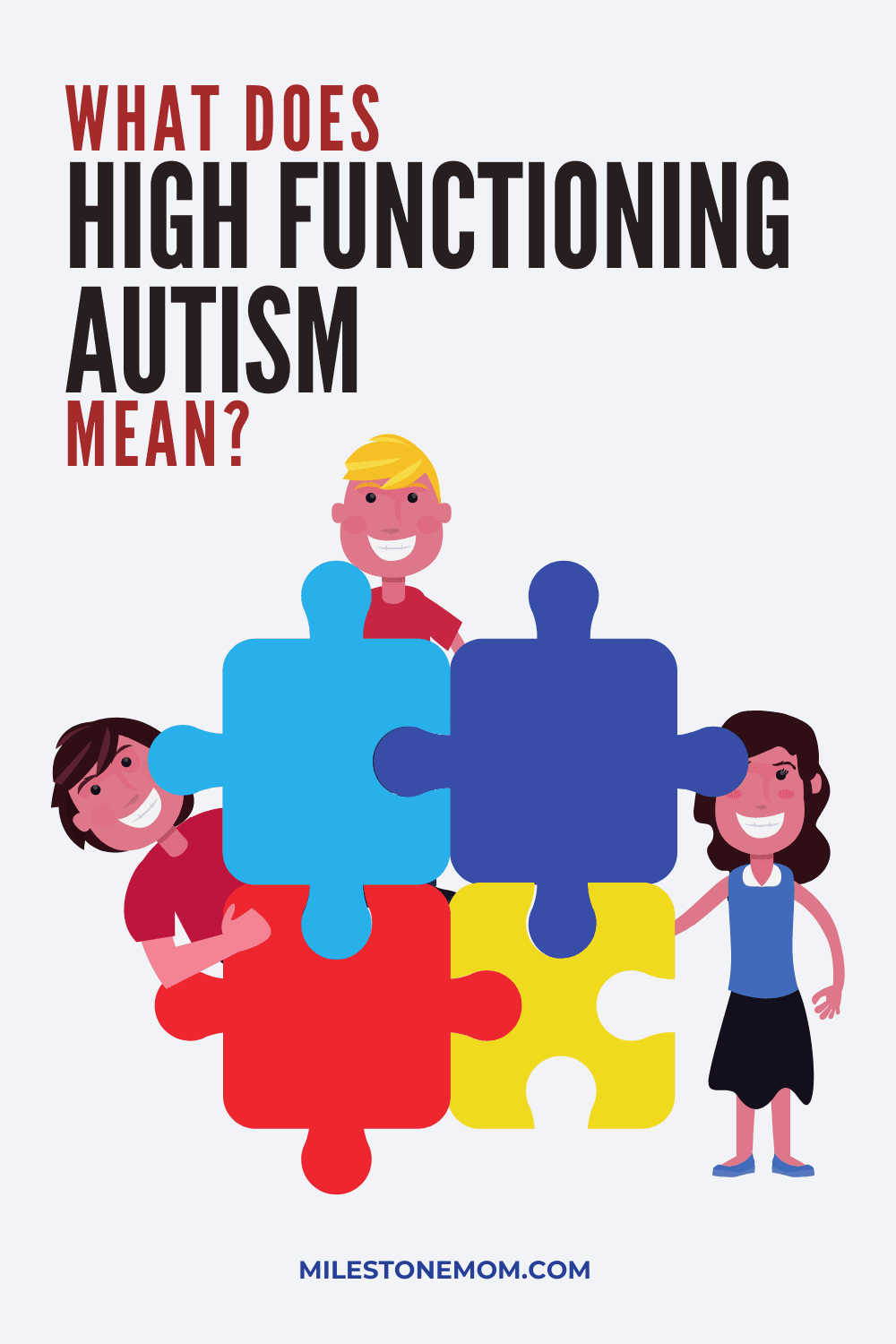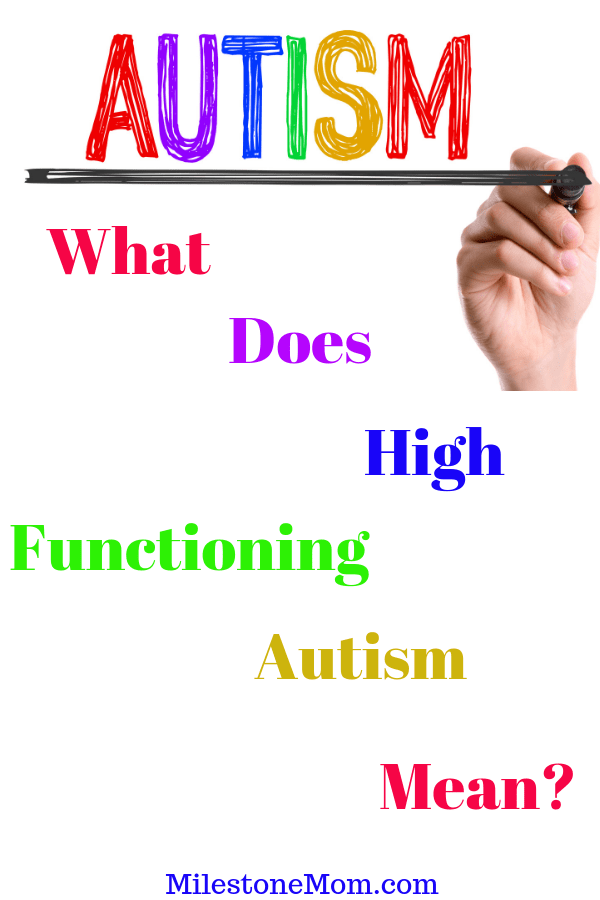What Does High Functioning Autism Mean?

Disclosure: This post may contain affiliate links, meaning if you decide to make a purchase through my links, we may earn a commission at no additional cost to you. Read about our affiliate policies here.
I was speaking to someone about the characteristics of high functioning autism the other day. We were talking about all the different personalities and types of high functioning autism there were. I surprised the person I was with by giving the statistics of autism. Boy, did I shock her!
It is estimated that 1 in 59 people have been diagnosed as being on the autism spectrum. This range includes many people diagnosed with autism that are completely nonverbal. This particular group of people will have minimal communication with the rest of the world. Yet, this also includes those who are able to function well in society. Hence, this is high functioning autism. There is a lot of variations across autism. This is why we call autism ASD (Autism Spectrum Disorder). Autism is truly a spectrum with varying degrees.
Learning About Autism
With a statistic that is as high as 1 in 59, it is important for all of us to learn what we can about autism. Even if we are not connected with someone who is autistic, we will most likely be one day. Maybe a family member hasn’t been diagnosed with autism. However, we may one day have a coworker or someone from church who does. Thus, it is important to know the terms and characteristics. This is especially true with the characteristics of high functioning autism.
Autism now impacts more people than it ever has in the past. Autism is a disorder that affects an individual’s social and communication skills. With children that have different variations of autism, it can be hard to understand at first all of the autism characteristics. High functioning autism is another story altogether and can be harder to define. Characteristics of high-functioning autism can vary from person to person but are similar in a lot of ways.
What is High Functioning Autism?
Before diving into the characteristics of high functioning autism it is important to know the definition of it. Characteristics of high functioning autism can be defined as an individual that exhibits relatively mild symptoms of the disorder. These people experience the symptoms to an extent that is enough to be categorized as suffering from autism spectrum disorder. For example, an individual may exhibit symptoms of autism, which we included below. However, they still may be able to successfully navigate and fulfill their functions and duties, whether in a school environment or in the workplace.
You may know someone with high functioning autism. You may have no idea that you know someone who has it. This is because so many people can do day-to-day activities and you may simply think of them as having a “quirk”.
Many times, some people do not even get diagnosed with this until adulthood. They may know that there is something different but may not be able to put their finger on it. The more that we can learn about these characteristics, the more that we can help children get diagnosed earlier so they can be provided with all the necessary tools they need in life.
Characteristics of High Functioning Autism
Certain signs and symptoms can be a pointer for high functioning autism in children. A child does not have to have all of these symptoms. At the same time, a child may have some of these symptoms but may not have high functioning autism. It is always important to consult a doctor or a developmental pediatrician in diagnosing your child on the autism spectrum.
Here are some of the examples of the characteristics of high functioning autism that I have seen:
- The child exhibits delayed speech initially, but later on, starts to outgrow it and has a functional communication system.
- The child has an extremely short attention span.
- They also tends to display a lack of social comfort, and may, at times, behave older and mature than his actual age.
- This may sometimes translate into an inability to adapt and be comfortable in social settings that involve kids of their own age. They may not be able to relate to jokes and sarcasm that kids of their age may enjoy.
- They may have an above average intelligence and logic, even at a very early age.
- When the child is over stimulated or tired, they may be prone to throwing tantrums and meltdowns.
- They may also be susceptible to sensory dysfunctions and may be unable to tolerate crowds and may display extreme sensitivity to strong tastes, bright lights, crowds and noises.
- The child may also be more prone to anxiety and depression.
Why is High Functioning Autism Hard to Define?
Decoding high functioning autism can be a big task. First of all, a lot of times people are misdiagnosed or not diagnosed at all. This is due to the difficulties of defining someone with autism that is extremely high functioning. Simply put, this is because autism itself can be so confusing to detect and understand. Here are some reasons why high functioning autism is hard to define:
- No two people affected by this condition are exactly the same
- The intensity of the symptoms can differ.
- The type of symptoms may differ.
- Autism is sometimes accidentally called a nonverbal/noncommunicative disease, so if someone is social they receive a misdiagnosis
Notes About High Functioning Autism
Children with the characteristics of high functioning autism may exhibit a need for support in some other settings and situations. For example, they may need assistance when they experience anxiety or become dysfunctional in a crowded place or area. Some of these behaviors are caught early on and children are referred to the Early Intervention Program. Here is a list of the Early Intervention Programs listed per your state.
It is important to note that autism is not something that can be outgrown in childhood or adulthood. Certain tools can help them fit better in society and accomplish the tasks they want to with ease.
Do you know someone who has high functioning autism? What characteristics do they show on a daily basis?
Don’t for get to read these amazing articles! How to Homeschool Your child with Special Needs and Vacationing with a Special Needs Child.

Join 10,000+ Subscribers
Join The Milestone Mom Newsletter
Get expert advice from a certified teacher and Pediatric Developmental Therapist directly in your inbox every week!






